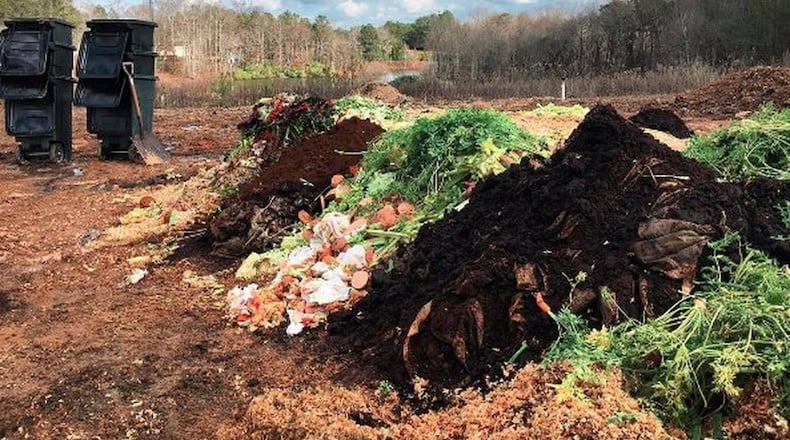Hearing day in and day out about how we’re destroying our planet is enough to drive me to binge eat an entire batch of chocolate chip cookies — and then fret about yet another epidemic of our times: obesity.
Yeah, you don't want to stand next to me at a cocktail party. I'll groan about air, water and soil pollution, or global warming and climate change. I'll moan about the loss of biodiversity and deforestation, or, perhaps, the fragile state of Earth's ozone layer. If I'm on a real run, I might tick off stats like how 40 percent of food is wasted in the U.S., or that 11.3 percent of food purchased at full-service restaurants goes to waste.
I know, I’m such a downer. Your Manhattan deserves better company.
<<Chefs ideas can help home cooks turn garbage into edible gold
I try to walk the walk, though. My résumé as a 21st-century hippie includes that of urban chicken farmer, community gardener and backyard composter. Of course, not everyone has the time, means or interest to make these activities part of their daily life. But, when Earth Day rolls around, everyone goes green in some fashion.
Among events in Atlanta planned around Earth Day, Ponce City Market has a long lineup, with numerous vendors planning events to bring out our inner tree hugger. Abbey Glass is taking dress donations. Mountain High is holding a running shoe recycling drive. The one calling my name is the DIY seed-bomb-making event that Rhen's Nest Toy Shop is hosting April 22, from 1 to 3:30 p.m., at the Shed on the Beltline. Participants will create seed bombs to take home and toss into spaces that need a touch of nature. (Tickets are $6 and can be purchased online at Eventbrite.) Three cheers for guerrilla gardening and green grenades!
These are one-off affairs, but Ponce City continues to take steps propertywide that it hopes will have a lasting impact on the environment. The food hall is the big draw there, and, beginning this month, it has taken steps to reduce food waste by partnering with Goodr, an Atlanta-based sustainable surplus food management company. In layman’s terms: Goodr is an app that lets businesses donate unused food to local organizations in need. Botiwalla, Farm to Ladle and Hop’s Chicken are the first food vendors at the market to participate in the pilot phase of the program. They will use the app to schedule donation pick-ups, and Goodr’s certified food handlers will deliver the donations to local nonprofits.
It’s exciting that these kinds of cutting-edge solutions are created — and put to use — here. Another is Compostwheels, the compost pickup service that David Paull founded in 2012, when he was a sophomore at Savannah College of Art and Design in Atlanta.
Paull’s business is part of the young community composting movement, created in response to cities that do not have municipal composting services. “Community-oriented activists decided to solve the problem,” he said.
Paull’s company has grown quickly in its six years, now serving more than 600 residential households and businesses in greater Atlanta. Among its 45 commercial customers, roughly 25 are food service providers, including Farm Burger, Yeah Burger, Souper Jenny and Dancing Goats Coffee Bar.
Coffee grounds and filters, pizza boxes, paper products and, of course, food scraps — even meat, bones and dairy — are sent to its compost facility, located on the King of Crops farm in Winston. (The farm was started by another Atlanta innovator, King of Pops.) “It’s one of the (few) permanent on-farm-type compost setups in the state,” Paull said.
<<Mind the waste: Rethinking leftovers and throwaways
Paull gets excited taking about black gold, but, what has him giddy right now is the recent merger of Compostwheels with CompostNow, a compost services company that serves North Carolina’s Triangle region. The merger, Paull said, will mean an expansion of everything. “If we had limitations to our scale, now we have the capacity to expand our operations greatly, collect more materials, reach more neighbors, be at more farmers markets for outreach and hire more people.”
CompostNow customers in Atlanta also now have more control over their service schedules and their compost. Those who donate the compost, instead of using it for their own gardens, can decide with the click of a button which partner farm (these include Aluma Farm, Freewheel Farm and Love is Love Farm) or community garden to send it to. And the list of participating community gardens is growing, too.
The cost of CompostNow services for residential clients is $19 for pickup every other week and $29 for weekly pickup. Services for commercial clients start at $100.
That the two companies have diverted a combined 5.5 million pounds from landfills, and delivered more than 528,000 pounds of the compost created by their customers to farms and community garden partners, is a big deal.
It might make something like a restaurant’s decision to eliminate plastic straws sound minor. But, considering that Americans use 500 million drinking straws every day (enough to fill 125 school buses), the waste adds up quickly.
<<Use these apps to help tackle food waste
Atlanta-based Ted's Montana Grill, co-founded by Ted Turner and George McKerrow, is a leader in the Be Straw Free campaign. And, earlier this year, Fifth Group Restaurants made the switch.
“We determined that, companywide, we were using about half a million plastic straws a year,” said Fifth Group founding partner Robby Kukler. The restaurant group operates six restaurant concepts — Alma Cocina, Ecco, El Taco, La Tavola, Lure and South City Kitchen — as well as Bold Catering & Design.
It switched to biodegradable straws, but, rather than hand them out automatically, it now provides them upon request. It also got rid of plastic stir sticks at the bar, switching instead to bamboo skewers, which are biodegradable.
Kukler estimated the cost to be 15 percent more than plastic, but the group feels it’s worth it, as it tries to be a zero-waste business, a model it embraced more than a decade ago with composting and recycling initiatives.
The straw swap was coupled with a change in its service approach. To conserve water, servers now offer water to guests instead of bringing it automatically. And, since it is difficult for metro Atlanta restaurants to recycle glass, Fifth Group switched its sparkling water option from one that comes in a glass bottle to the canned, locally made Montane brand.
I’ll drink to that — and all these efforts to make our food system more ecological, equitable and efficient.
Happy Earth Day.
About the Author
The Latest
Featured





